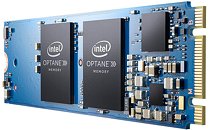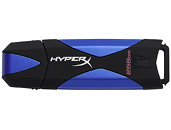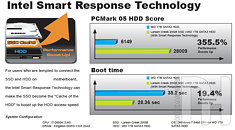
Intel's First Client Optane Product is a Cache SSD
Intel's first consumer (client) SSD based on its revolutionary new 3D Xpoint memory is an Optane branded cache SSD that improves the performance of slower local storage, such as hard drives, or even slower NAND flash based SSDs. On machines with larger hard drives, Intel claims that a 3D Xpoint based cache SSD could halve booting times, improve overall system performance by 28 percent, and lower game level load times by up to 65 percent. As a cache-SSD, it's also designed to be affordable, and that's because it's local storage is 16 GB or 32 GB.
The target consumer is one that which is transitioning from hard drives to SSDs, and is happy with a noticeable performance boost, as long as they don't lose the immense capacities of their HDDs. It also targets gamers with SSDs that are running out of space for multiple >50 GB games, so they could start installing some of those games on their larger/slower HDDs and get reasonably improved performance. As with all SSD caching technologies from Intel in the past, such as the ReadyBoost and Smart Response, Optane cache SSDs juggle "hot data" (frequently accessed data) in and out of their user-space from the host storage. On the software side of things, Intel Rapid Storage Technology 15.5 and later handles the caching tasks.
The target consumer is one that which is transitioning from hard drives to SSDs, and is happy with a noticeable performance boost, as long as they don't lose the immense capacities of their HDDs. It also targets gamers with SSDs that are running out of space for multiple >50 GB games, so they could start installing some of those games on their larger/slower HDDs and get reasonably improved performance. As with all SSD caching technologies from Intel in the past, such as the ReadyBoost and Smart Response, Optane cache SSDs juggle "hot data" (frequently accessed data) in and out of their user-space from the host storage. On the software side of things, Intel Rapid Storage Technology 15.5 and later handles the caching tasks.





















